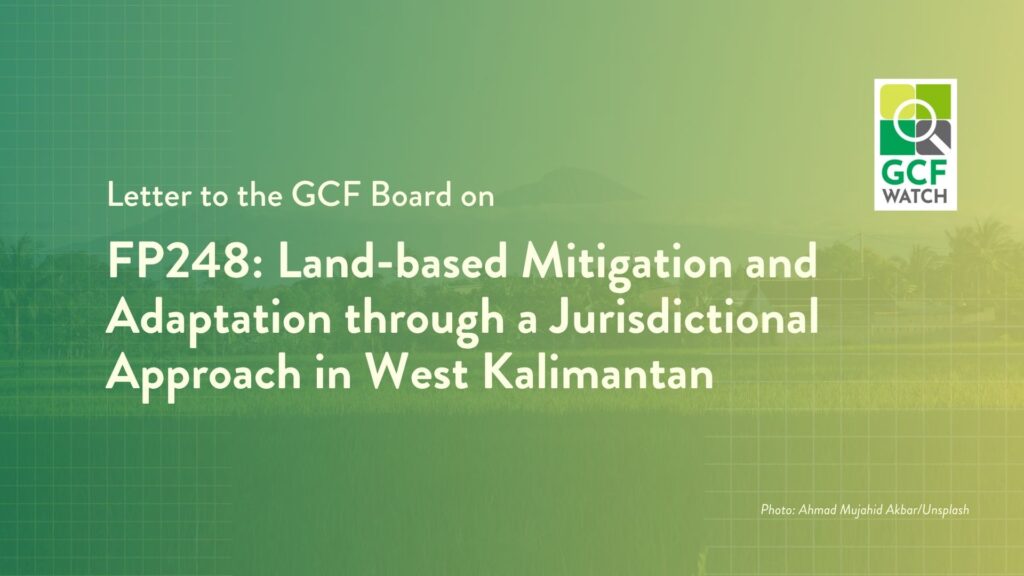Updates from Day 3 of the 36th GCF Board Meeting
From The Asian Peoples’ Movement on Debt and Development (APMDD)
Scan the QR code above or click here to access the full copy of CSO updates for the 36th Board Meeting of GCF.
DAY 3 – 12 July 2023
Day 3 commenced with the Board’s adoption of the proposed revisions to the Readiness and Preparatory Support Program (RPSP) and the new Operating Modalities of the Project Preparation Facility (PPF).
The Secretariat’s proposed revisions to the RPSP aimed to shift the focus of readiness towards country approaches rather than engaging stakeholders individually. It also emphasized the need to provide more financial support to countries and implement timetables for achieving results. The revised RPSP sought to convene stakeholders within countries to develop their national adaptation programs (NAPs), long-term strategies (LTS), and provide support in building their respective nationally determined contributions (NDCs). In order to do so, at least USD 8.3 million will need to be allocated per country to hire more consultants, with an established timeline of 6 to 18 months. These measures were expected to result in stronger and more Direct Access Entities (DAEs) from least developed countries (LDCs) and small island developing states (SIDS) that are ready to access funding from the Green Climate Fund (GCF).
While the RPSP focused on preparing countries to access the GCF, submitting funding proposals (FPs) to the GCF posed a different challenge, particularly for DAEs from LDCs and SIDS. The revised PPF sought USD 90.6 million to hire more consultants that are expected to help in making climate impact assessments, ensure increased co-financing, and maximize private sector funding in FPs. It is worth noting that many adaptation FPs submitted to the Secretariat were not recommended for Board consideration at this meeting due to the lack of a “climate rationale,” which has been a long-standing issue encountered by AEs.
While both developed and developing country Board Members expressed support for the revisions, they had opposing views on certain elements. Developing country BMs expressed concerns about the amount of resources required and the focus on hiring consultants, and called for long-term capacity building for stakeholders. Developed country BMs on the other hand, remained silent on the issue of consultants but requested clarification on the coherence and complementarity of the FPs with those in other climate funds and UNFCCC bodies–to avoid redundancies in funding.
Tara Daniel, civil society alternate active observer (CSO AO) from developed countries, intervened on behalf of the GCF Observer network. The intervention emphasized the importance of building readiness and FPs based on the knowledge of communities, indigenous people, and women, as opposed to ones that are heavily reliant on consultants. The CSOs also criticized how the FPs reflect private sector approaches and urged the GCF to build long-term capacity among its AEs rather than its current fragmented and piecemeal approach that disadvantages those with limited capacity such as the DAEs.
The Board continued discussing additional suggestions for the proposed revisions, including the need to prioritize DAEs from SIDS and LDCs in accessing the RPSP and PPF, determine the timeline and implementation phases of the proposed revisions, and ensure further integration of existing GCF policies such as the newly approved Updated Strategic Plan (USP). Some BMs also requested more evidence to support the rationale behind the proposed changes and the resulting new activities. As many items needed further offline consultations, the Board urged the Secretariat to continue with the revisions and incorporate the points raised in time for the next Board Meeting.
The Board then discussed the proposed Local Currency Financing Pilot (LCFP), which is a document that provided policy recommendations around currency fluctuations. It can be recalled that the GCF reported having a total of USD 1.6 billion foreign exchange loss during its Initial Resource Mobilization (IRM). Also, as the Fund’s support comes in US dollars, the value differences of the USD against local currencies affect project financing and eventually creates challenges for AEs when repaying loans to the GCF. To address this, the Board’s Investment Committee (IC) and Secretariat were requested to provide policy recommendations.
The IC and the Secretariat proposed launching the LCFP among selected FPs in the GCF’s pipeline that could benefit from local currency financing. They believe that if these FPs funded using local currencies can maintain compliance with existing GCF policies, then the GCF will finance them accordingly. The LCFP also includes a provision that mandates the Secretariat in developing appropriate policies aimed to mitigate foreign exchange risks in general, and optimize the GCF’s foreign exchange buffer. The Secretariat added that the implementation of these proposals are to occur in phases, and the specific financial instruments used for the LCFP will be determined based on the Board’s decision.
BMs from Honduras and Mali highlighted the need for a systemic approach beyond the options presented and noted that the current LCFP documentation failed to indicate whether or not consultations were made with key institutions such as the central banks in developing countries. The Board Member from Honduras added how small economies of developing countries are sensitive to currency fluctuations, and argued for a more careful approach to avoid negative impacts and that proper consultations with monetary authorities should be done.
Eileen Cunningham, CSO AO from developing countries, shared the Observer Network’s position on how the LCFP should ensure that any additional costs associated with the pilot will not burden beneficiaries and developing countries. The CSOs emphasized the need to focus more on grant financing, particularly as GCF projects with a debt or non-grant component are majorly exposed to foreign exchange risks, and added that communities in the Global South are already grappling with debt crises alongside other challenges. The GCF must not overburden them further by encouraging more debt-creating climate projects. The BM from Mali echoed these sentiments.
Considering the complexity of the topic and the divergent views on specific activities to implement the LCFP, the Board decided to suspend the discussion and postpone the consideration of an updated proposal until B37.
The next item on the Board’s agenda for Day 3 was the Consideration of Accreditation Proposals. The discussion commenced with the Secretariat presenting key figures on the GCF’s accreditation pipeline, and with some updates on the implementation of the Updated Accreditation Framework (UAF) that was approved last B35.
According to the Secretariat, there have been significant improvements in the speed of processing accreditation and re-accreditation applications since the implementation of the UAF. However, no statistics were provided to substantiate these claims. They highlighted the prioritization of re-accreditation proposals over accreditation of new applications to avoid delays in the approval or implementation of FPs due to expired accreditation status of some AEs. They also informed the Board about the ongoing implementation of the Project-Specific Accreditation Approach (PSAA), which has been expediting applications for applicants that demonstrate suitability for specific project types and/or are the first to apply for accreditation in their respective regions or countries.
Several developing country BMs raised their observations regarding the current batch of applicants. The BM from Bhutan expressed concern over the lack of applicants from least developed countries (LDCs) despite ongoing initiatives to support LDCs and reiterated the need to prioritize LDC access to the GCF. The BM from Mali shared his observation that apart from RAPL011 Fundacion Avina, all the other applicants were banks or financial corporations. He argued that the GCF may be focusing more on financialization rather than effectively delivering climate action that is responsive and accessible to the needs of developing countries.
Private Sector Active Observer (AO) Margaret-Ann Splawn intervened in the discussion and shared the challenges faced by international access entities (IAEs) in obtaining accreditation or re-accreditation. She pointed out that the transparency requirements imposed by the GCF were overly burdensome, which often required shareholder approval. She pleaded to the GCF and the Board to ease the process for the private sector and refrain from making it unnecessarily difficult.
After the general discussion on accreditation, the Secretariat presented each accreditation and re-accreditation applicant to the Board. The following table summarizes the details of the applications and the Board’s deliberations:
|
Applicant Details |
Board Discussion |
Status |
| RAPL035: Banque Ouest Africaine de Développement (BOAD) (Development Bank of West Africa)
Country: Togo (headquarters) DAE (Regional) Size: Medium ESS Risk: High (Category A/I-1) Changes to Accreditation: Category B/I-2 to Category A/I-1. |
BOAD requested an upgrade in its accreditation from Category B/I-2 to Category A/I-1 to enable it to do more high-risk projects.
During the discussion, the BM from Switzerland proposed including references to BOAD’s policies that demonstrate its commitment to aligning with the Paris Agreement (PA) in the decision text. However, the BMs from Antigua and Barbuda and Mali opposed this suggestion, arguing that referencing such policies was unnecessary. They also argued that, in general, commitment to the PA is beyond just adopting policies and should be based on the principle of Common But Differentiated Responsibilities (CBDR). They deemed adding such references to the decision text as redundant and cautioned against setting a dangerous precedent within the GCF. Ultimately, the Board Members from Antigua and Barbuda and Mali withdrew their objections to the proposal by the BM from Switzerland. Nevertheless, they made it clear on record that while they agree, in principle, to the suggested text, it should not establish a precedent for future accreditation and re-accreditation applications. After extensive deliberation, the Board approved the re-accreditation of BOAD. |
REACCREDITED |
| RAPL011: Corporacion Andina de Fomento (CAF) (Development Bank of Latin America)
Country: Venezuela (headquarters) DAE (Regional) Size: Large ESS Risk: High (Category A/I-1) Changes to Accreditation: None |
The BM from Switzerland, supported by some developed country Board Members, proposed incorporating similar references to the applicants’ policies for being “Paris-aligned” in the decision text. The Board Members from France and Sweden expressed their support for this suggestion.
However, the BMs from Saudi Arabia and Cuba, along with some developing country BMs, opposed the proposal for the same reasons that they raised for the previous re-accreditation applicant. The BMs from the Latin America and Caribbean (LAC) also argued that CAF is already making progress with their Paris goals alignment efforts. Contrary to the claims made by some LAC Board Members, the civil society active observer (CSO AO) from developing countries, Eileen Cunningham, pointed out that CAF was still funding fossil fuels and increasing investments in fossil gas exploration, specifically fracking. She emphasized the need to include strong conditions in CAF’s re-accreditation to ensure that it will shift away from fossil fuel financing. After offline consultations, the BMs from Saudi Arabia and Cuba accepted the suggestion put forward by the BM from Switzerland. They, however, made it clear on record that their agreement to the suggestion should not establish a precedent for future re-accreditation applications. Following a lengthy discussion, CAF was re-accredited by the Board. |
REACCREDITED |
| RAPL047: Fundacion Avina
Country: Panama DAE Size: Micro ESS Risk: Minimal to no risk (Categocy C/I-3) Changes to Accreditation: None |
Fundacion Avina’s application was instantly approved since the Board had no comments about its application. | REACCREDITED |
| RAPL015: Agence Française de Développement (AFD) (French Development Agency)
IAE Country: France Size: Large ESS Risk: High (Category A/I-1) Changes to Accreditation: None |
Similar to his suggestion for the BOAD and CAF accreditations, the BM from Switzerland suggested adding to the decision text references to AFD’s policies which states its commitment to Paris-alignment. There were no oppositions to this suggestion and AFD was re-accredited. | REACCREDITED |
| APL118: Corporacion National para el Desarrollo (CND Uruguay) (National Corporation for Development Uruguay)
Country: Uruguay DAE (national) Size: Small ESS Risk: Medium (Category/I-2) |
CND Uruguay’s application was instantly approved since the Board had no comments about its application. | ACCREDITED |
| APL119: Development Bank of Jamaica (DBJ)
Country: Jamaica DAE (national) Size: Large ESS Risk: Medium (Category B/I-2) |
DBJ’s application was instantly approved since the Board had no comments about its application. | ACCREDITED |
| APL120: DFCC Bank PLC
Country: Sri Lanka DAE (national) Size: Medium ESS Risk: Medium (Category B/I-2) |
DFCC Bank’s application was instantly approved since the Board had no comments about its application. | ACCREDITED |
| APL121: responsAbility Investments AG
Country: Switzerland (headquarters) IAE Size: Large ESS Risk: Medium (Category B/I-2) |
During the discussion, no comments were raised by the Board Members. However, CSO AO from developed countries Erika Lennon posed questions to the Secretariat regarding the applicant’s inability to comply with several requirements. The CSOs also sought clarifications on the implications of these missing submissions, particularly in light of the ongoing implementation of the Project-Specific Accreditation Approach (PSAA). In closing, Erika emphasized the advocacy of the Observer Network for equity and transparency in the accreditation process.
The Board then moved to approve the accreditation of APL121. |
ACCREDITED |
After engaging in a lengthy discussion on accreditation applications, the Board proceeded to address the Updated Policy for Contributions to the 2nd Replenishment of the GCF (GCF-2). It can be recalled that on Day 2, no consensus was reached due to diverging views between developed and developing country BMs regarding the minimum contributions and mechanisms for enforcing contributions in case of non-confirmation or non-delivery. Following offline negotiations held, the Board made the decision to remove the minimum contribution requirement grants, and only require such minimum contributions for contributions in the form of loans. The Board also decided to explore potential options for enforcing contributions in the event of non-confirmation or non-delivery of pledges. These options will be presented to the Board and considered at B37, along with a financial management plan for contributions received under GCF-2.
With the adoption of the new contribution policy, the Board proceeded to enter an executive session to discuss the Report on the Activities of the Secretariats. The discussion focused on various confidential matters, including Accreditation Master Agreements (AMAs) of selected Accredited Entities (AEs), as well as some proposed changes to Funding Proposals FP098 and FP197, and the review of IRM Compliance Report C-0006. As a result, the livestream of the session was suspended, and only the Board Members and designated personnel were allowed in the Boardroom.
Day 3 ended after the said executive sessions. You can catch GCF B36 via webcast and on demand here: https://www.greenclimate.fund/boardroom/meeting/b36#videos.
###









